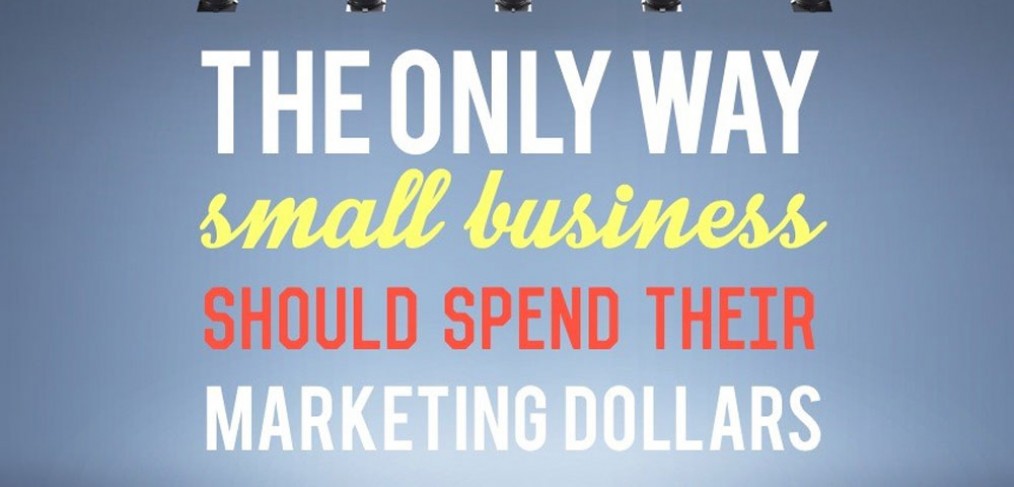
Only Way Business Should Spend Their Marketing Dollars
In my time as a business owner I have always followed the success of like-businesses closely. The key to success is learning from others, right? Not always as it turns out. With a keen eye and ear, I have always looked to businesses I aspired to be like. Typically big business as they’re largely the subjects of the business books we read and because their success is so grand, inspiring and motivating.
While looking to the success stories in my industry my thoughts at the time were, ‘they are doing ‘x-type’ marketing, they are successful, I should be doing what they’re doing’. A reasonable approach in some elements of business but very dangerous when it comes to marketing, particularly if you’re dealing with a far smaller budget . Playing in a space that bigger business advertised in, for me, was costly and ineffective. Our customers were in that space, they just weren’t converting into paying customers at a reasonable ROI. It was my biggest marketing-spend lesson. That money would have been better spent elsewhere.
If I’d only asked the sales person more specifically about the success of other same-sized businesses! If I’d asked for a clear measurement of the return on investment businesses the same-size businesses as mine had seen, rather than being mesmerised by the audience size, I might have saved myself some serious cash.
Marketing is an investment. If that investment doesn’t pay, it should be refined or canned. Test, track and analyse (then repeat) the marketing dollars you spend. Your website, print ads, flyers, search engine and social media spend can all be monitored, tracked and analysed.
The most common way to track effectiveness is by offering incentives to visit and purchase. You may have seen the ’cut out and present’ newspaper coupons, one form of tracking. For example on social media or in email you are likely to have seen a business suggest a word be quoted when you visit their physical store. In the online space, you may be invited to ‘enter a code’ at the checkout. Allocating different codes for different sources of web and print traffic is an accurate and effective means track and calculate the return on investment. Each code is uniquely tracked to see which marketing method is bringing the best return. The most successful driver of paying customers gets to stay, the others are let go. You can easily mix tracking methods across different campaigns, on and offline. Planned well, these are simple methods to track and quantify your marketing effectiveness.
If you’re not marketing in the online space (where analytics can be drawn on a lot more easily) you still need to determine each campaigns true cost. At the most basic level and for every purchase driven by incentive, the campaign costs should be calculated to include the incentive given and how much turnover can be attributed directly as a result of the incentive . It should be calculated so as to make sure you are breaking even on the initiative.
Once you start recording each campaign you will be able to see the real monetary benefit to your business in detail. The success of one campaign over another without collating information is just an educated guess at best and is far less effective than an accurate measure of return on investment.
Sales people selling space, position, online traffic, air time (or otherwise) declaring they have a large audience of your target market sounds ideal but unless they can provide real, specific examples of how those readers converted to paying (not potential) customers, you would be best to look elsewhere. It’s surprising how loosely attributed results are in some spaces, so clarity on specific results is necessary before you commit to expenses like these.
In the small to medium sized business market, money is best spent when it generates a measurable, positive return on investment otherwise it’s classified as a brand awareness exercise. If that’s what you set out to achieve, great. If not, start tracking the results.
To help you achieve the biggest bang for your marketing buck, you need to select an advertising or marketing medium that has proven clear and specific results.
Many businesses fail to measure their marketing efforts. ‘There’s been a bit more business’, ‘I’ve been getting a lot more calls’ may be the comment. Unfortunately that doesn’t mean anything unless you’re able to say ‘that campaign generated $x dollars’.
Here’s my theory to getting the best results:
Choose a marketing campaign with a clear start and end date. Where you can, make it topical, relevant and shareable for your audience with content and tone that resonates with your ideal customer.
Set a target for what you reasonably expect as the financial return.
Activate a campaign with a measurable component (a specific code, present a voucher, print out an email, show an sms message), something that is a unique identifier of that campaign and connects it directly back to bringing in paying customers. Track sales by attributing the unique identifier to the specific outcome.
If you’re planning on paying someone else to market your business, ask them for testimonials of the return on investment and how they track their effectiveness. Ask, how much revenue can be directly attributed to that campaign? (Remember audience size isn’t the metric here). Great results for a larger business than yours is likely an irrelevant comparative for you. Compare like-businesses or at least like-sized businesses results to decide if that marketing campaign is right for you to commence.
Keep records of all of your marketing campaigns including duration, cost to the business and the financial returns for future reference. A quick glance over previous efforts will put you in good stead for better decision making going forward.
Just think right now if you had a record of every marketing effort you’d spent money on, you’d be perfectly positioned to determine what to steer clear of and what to do again. We’re all seeking the biggest bang for our marketing buck. Continually planning, tracking and analysing the results is what will give you the insight to a more successful campaign in the future. Get tracking!



